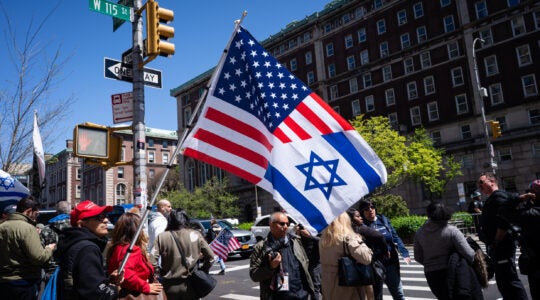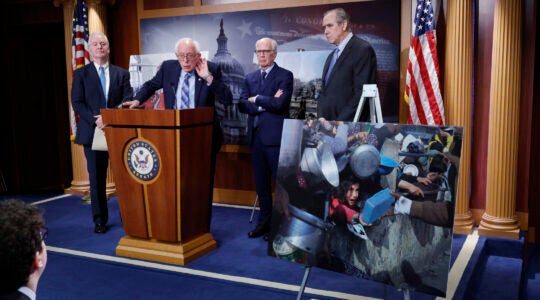NEW YORK (JTA) – For Rabbi Felipe Goodman, a recently naturalized U.S. citizen and the religious leader of Temple Beth Sholom in Las Vegas, participating in the presidential nominating process was going to be an important milestone in his integration into American society.
But now, as the nation turns to the Nevada caucuses this weekend, the Conservative rabbi feels like an outsider – not as a Mexican immigrant, but as an American Jew.
Goodman and many other religious Jews in Nevada are upset that the state’s Democratic and Republican parties scheduled their respective caucuses to start on the morning of Jan. 19, during Shabbat services.
Unlike primaries, which allow for absentee voting, the more elaborate and collaborative caucusing process requires voters to arrive at polling stations at specific times: If you can’t show up, you can’t participate.
“I’m so disappointed,” Goodman told JTA. “It’s almost like being Jewish now is a punishment.”
Anger over the issue is beginning to spread beyond the Nevada Jewish community of 65,000 to 80,000 members.
In a post last week on its election blog, the Jewish Council for Public Affairs – an umbrella group that includes the major synagogue movements and several prominent national Jewish organizations – criticized the decision to hold the caucuses on a Saturday morning. Soon after, the Orthodox Union added its criticism in a Washington blog posting titled “Shanda in Nevada.”
Nevada has held primaries in the past several presidential election cycles. But in a bid largely to wield added influence and attract more attention, the two parties decided to have caucuses and move up the date to January. Nevada in 2004 held its primary in February.
The communications director for the Republican caucuses, Steve Wark, told JTA that the Republicans were following the Democrats’ lead in choosing Jan. 19. As for the morning time, Wark said that decision was made to increase media exposure, even though a later time probably would have drawn more participants.
Wark says the caucus format encourages candidates to campaign in more intimate settings and helps foster party cohesion – an elusive goal in a state with a fast-growing population. The GOP official said he had not received any complaints about the date, even from two of his religiously observant Jewish friends.
The state Democratic Party – which boasts some prominent Jewish members, including Las Vegas Mayor Oscar Goodman and U.S. Rep. Shelley Berkley – did not respond to an e-mail seeking comment. Berkley, who is serving as co-chairwoman of the Democratic caucuses, also did not respond to requests for comment.
Goodman said he raised the issue with Berkley at a dinner where they were seated next to each other.
“She said she hadn’t realized that it was Shabbat,” he recalled. “She was clearly concerned. She promised it would never happen again.”
After months of saying she would remain neutral, Berkley announced last week that she was backing Sen. Hillary Rodham Clinton (D-N.Y.).
In recent months, the Forward newspaper reported, the Clinton campaign has announced the support of several other prominent members of the Nevada Jewish community, including Stephen Cloobeck, the chairman and CEO of Diamond Resorts International, and Myra Greenspun, the wife of Brian Greenspun, a longtime friend of Bill Clinton and owner of the Las Vegas Sun newspaper.
Elaine Wynn, the wife of casino mogul and developer Steve Wynn, reportedly has given money to the campaign of Sen. Barack Obama (D-Ill.).
In the Republican race, Sheldon Adelson, America’s wealthiest Jew and CEO of the Las Vegas Sands Corp., is backing Rudy Giuliani, the former New York City mayor.
For Nevada Jews concerned about the Sabbath issue, the focus is not on whom to support but how to participate.
JCPA officials said that when they contacted the state’s Democratic Party, staffers there were aware of the issue and attempting to locate caucus locations near synagogues. They also were instructing precinct leaders to be sensitive to participants whose religious observance bars them from writing on the Sabbath.
The problem, said Rabbi Yaakov Wasser of Congregation Shaarei Tefilla, an Orthodox synagogue in Las Vegas, is that taking part in such activities is inappropriate on Shabbat even if one avoids specific violations of religious prohibitions.
“Some of my congregants feel it is really unfair, like they’re being treated like second-class citizens,” Wasser said. “They don’t know what to do about it.”
Two of those upset congregants are Clinton supporters Steve and Sandy Reidenberg, members of the Clark County Democratic Club and residents of an over-55 community in the Las Vegas suburb of Sun City Anthem.
Steve Reidenberg complained that in addition to the Shabbat morning caucus, this year’s state Democratic convention coincides with the beginning of Passover. He said he knows of one local Democratic official who is willing to attend a meeting during the first two days of Passover, when work is prohibited under traditional Jewish law, but doesn’t know what to do about finding a seder to attend in Carson City.
Sandy Reidenberg recounted how some local Democrats tried in vain to figure out a way to accommodate voters in her family’s situation.
“One person asked, ‘Can you get dispensation from your rabbi?’ ” she recalled. “I said, ‘We don’t do that in the Jewish religion.’ “
Goodman said he received markedly different responses reaching out to the Clinton and Obama campaigns about the issue.
According to the rabbi, Obama’s campaign was patient and responsive, if ultimately unhelpful. By contrast, he said, Clinton campaign staffers essentially hung up on him.
“It was really not nice,” he said. “They didn’t want to hear it. They were too busy to talk to us about the thing on Shabbat. So if I was ever going to vote for her, she lost my vote on that one.”
In response to a call from JTA, the communications director for the Clinton campaign in Nevada, Hilarie Grey, left a voice mail message apologizing for any rudeness that took place and said she would look into the matter. She also said the Clinton campaign had not been involved in the caucus scheduling.
Later, she added, “That shouldn’t have happened. Our volunteers are trained to be polite on the phone, to listen and to route folks to the right person to hear their concerns.”
JTA has documented Jewish history in real-time for over a century. Keep our journalism strong by joining us in supporting independent, award-winning reporting.





